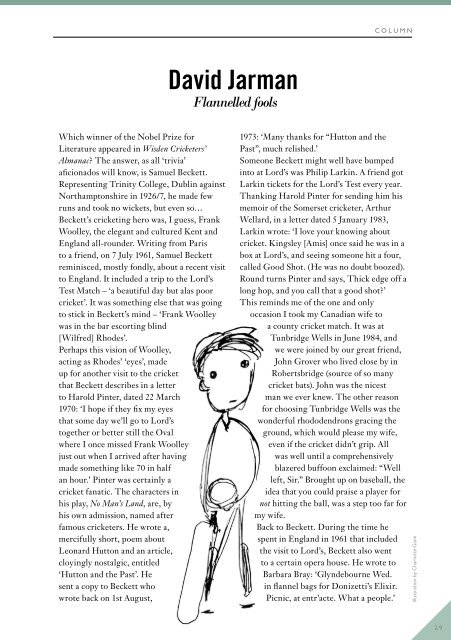Viva Lewes Issue #153 June 2019
Create successful ePaper yourself
Turn your PDF publications into a flip-book with our unique Google optimized e-Paper software.
COLUMN<br />
David Jarman<br />
Flannelled fools<br />
Which winner of the Nobel Prize for<br />
Literature appeared in Wisden Cricketers’<br />
Almanac? The answer, as all ‘trivia’<br />
aficionados will know, is Samuel Beckett.<br />
Representing Trinity College, Dublin against<br />
Northamptonshire in 1926/7, he made few<br />
runs and took no wickets, but even so…<br />
Beckett’s cricketing hero was, I guess, Frank<br />
Woolley, the elegant and cultured Kent and<br />
England all-rounder. Writing from Paris<br />
to a friend, on 7 July 1961, Samuel Beckett<br />
reminisced, mostly fondly, about a recent visit<br />
to England. It included a trip to the Lord’s<br />
Test Match – ‘a beautiful day but alas poor<br />
cricket’. It was something else that was going<br />
to stick in Beckett’s mind – ‘Frank Woolley<br />
was in the bar escorting blind<br />
[Wilfred] Rhodes’.<br />
Perhaps this vision of Woolley,<br />
acting as Rhodes’ ‘eyes’, made<br />
up for another visit to the cricket<br />
that Beckett describes in a letter<br />
to Harold Pinter, dated 22 March<br />
1970: ‘I hope if they fix my eyes<br />
that some day we’ll go to Lord’s<br />
together or better still the Oval<br />
where I once missed Frank Woolley<br />
just out when I arrived after having<br />
made something like 70 in half<br />
an hour.’ Pinter was certainly a<br />
cricket fanatic. The characters in<br />
his play, No Man’s Land, are, by<br />
his own admission, named after<br />
famous cricketers. He wrote a,<br />
mercifully short, poem about<br />
Leonard Hutton and an article,<br />
cloyingly nostalgic, entitled<br />
‘Hutton and the Past’. He<br />
sent a copy to Beckett who<br />
wrote back on 1st August,<br />
1973: ‘Many thanks for “Hutton and the<br />
Past”, much relished.’<br />
Someone Beckett might well have bumped<br />
into at Lord’s was Philip Larkin. A friend got<br />
Larkin tickets for the Lord’s Test every year.<br />
Thanking Harold Pinter for sending him his<br />
memoir of the Somerset cricketer, Arthur<br />
Wellard, in a letter dated 5 January 1983,<br />
Larkin wrote: ‘I love your knowing about<br />
cricket. Kingsley [Amis] once said he was in a<br />
box at Lord’s, and seeing someone hit a four,<br />
called Good Shot. (He was no doubt boozed).<br />
Round turns Pinter and says, Thick edge off a<br />
long hop, and you call that a good shot?’<br />
This reminds me of the one and only<br />
occasion I took my Canadian wife to<br />
a county cricket match. It was at<br />
Tunbridge Wells in <strong>June</strong> 1984, and<br />
we were joined by our great friend,<br />
John Grover who lived close by in<br />
Robertsbridge (source of so many<br />
cricket bats). John was the nicest<br />
man we ever knew. The other reason<br />
for choosing Tunbridge Wells was the<br />
wonderful rhododendrons gracing the<br />
ground, which would please my wife,<br />
even if the cricket didn’t grip. All<br />
was well until a comprehensively<br />
blazered buffoon exclaimed: “Well<br />
left, Sir.” Brought up on baseball, the<br />
idea that you could praise a player for<br />
not hitting the ball, was a step too far for<br />
my wife.<br />
Back to Beckett. During the time he<br />
spent in England in 1961 that included<br />
the visit to Lord’s, Beckett also went<br />
to a certain opera house. He wrote to<br />
Barbara Bray: ‘Glyndebourne Wed.<br />
in flannel bags for Donizetti’s Elixir.<br />
Picnic, at entr’acte. What a people.’<br />
Illustration by Charlotte Gann<br />
29


















